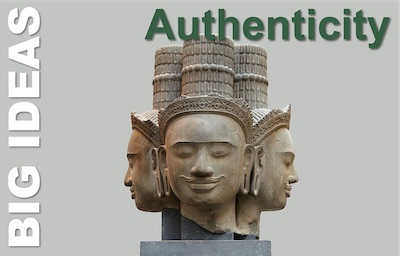
 Nobody likes a fraud… yet we tolerate them. Nobody wants to be a phoney… but we all let ourselves down on occasion. But regardless of our actions, we all value authenticity.
Nobody likes a fraud… yet we tolerate them. Nobody wants to be a phoney… but we all let ourselves down on occasion. But regardless of our actions, we all value authenticity.
The challenge of course is not just to recognise it, and distinguish the authentic from the ersatz.
It’s to form a clear idea of what you mean by authenticity. Because in modern business and professional parlance, it’s become a bit of a chameleon.
Why Does Authenticity Matter?
We go to work and we put on our work face. We go home and we put on our home face. Then we socialise and put on our social face. We all have so many faces, we’d make Brahma* jealous.
Increasingly, though, work is becoming less and less formal. And for many, the boundaries are blurring between work and other aspects of our lives. So people seeing us in many contexts want to see the same person.
We feel that if the person at work is different from the one at the club, then maybe one is false. And that sows distrust.
Authenticity shows the same face to everyone.
What is Authenticity?
It’s sometimes easier to spell out what authenticity is not. It is not fake, false, or phoney. Instead, it is being honest to who we are.
So, ‘Be Yourself’?
Sometimes, yes. But be careful. Work contexts are more formal than social ones. So you do need to adapt. Gareth Jones is the author of Why Should Anyone be Led by You (US|UK) and Why Should Anyone Work Here (US|UK), about authentic leadership. He suggests:
‘If you want to be a leader, you have to be yourself – skillfully.’
So, for me, authenticity is about being true to yourself, rather than just being yourself. Be true to yourself in a way that is contextually appropriate.
Beliefs and Attitudes
What I think matters most in authenticity for managers, leaders, and professionals is acting in a way that is consistent with your beliefs and values. And soon as you become incongruent in this sense, you become inauthentic.
This is very much consistent with the use of ‘Authenticity’ in existential philosophy. Heidegger said authenticity is a response, not to the general situation, but to the particular situation. It is exercising your own autonomy.
But it is not stepping outside the bounds of what is culturally allowed in the context. Heidegger said that being authentic, you will still do ‘what one does’. But society offers a range of behaviours that fit its norms, and authenticity allows you to choose those that are true to yourself.
Inauthenticity Hurts You
This is not just because people mistrust you when you act inauthentically. Although, they do. We try to avoid anyone we perceive as a phoney.
But it hurts you emotionally too.
Kierkergaard said:
‘being your true self is the opposite of despair’
He saw authenticity as a route away from angst. When we commit to the Heideggerian journey away from ‘Uneigentlichkeit’ to ‘Eigentlichkeit’ (from Inauthenticity to Authenticity), we start to live for ourselves.
How to be Authentic
Authenticity is a matter of character. But it goes beyond walking the walk and doing as you say. Humanistic psychology has made a study of authenticity. It defines it as an aspect of psychological maturity.
Here are signs of authenticity, and what to do to display them.
- Realistic perception of reality. Challenge your assumptions and biases. Gather information from multiple sources. Ask questions and avoid rhetorical echo chambers where people all think and speak as you do.
- Accepting of yourself. Make a careful assessment of your strengths and weaknesses. Accept them as a snapshot, and adopt a growth mindset as the starting point to enhancing your capabilities step by step.
- Accepting of other people. Take people as you find them. You can’t change them, so if you can’t tolerate them, step away.
- Thoughtfulness. Make time to reflect and consider, before decisions, and at the end of actions.
- A non-hostile sense of humor. We all have a sense of humour, but some try to use it to hurt other people. Don’t do that. As my mum used to say: ‘if you can’t say something nice; don’t say anything.’
- Expressing your emotions freely and clearly. For some, this will take a lot of work. But for a start, stop lying about how you feel.
- Open to learning from your mistakes. Let’s face it, you’ll make loads. And research into learning suggests we can learn more quickly and more deeply when we learn from mistakes. So embrace them as a necessary step on the journey, and reflect on what they can teach you.
- Understand your own motivations. Is what you are planning to do driven by noble or ignoble motives? You may accept that you do some things through self-interest. At least own up to that to yourself.
What is Your experience of Authenticity in the Workplace?
We’d love to hear your experiences, ideas, and questions. Please leave them in the comments below.
* Brahma is a creator god in Hindu mythology. He is represented with four faces. That’s twice what the lowly Roman god Janus could muster.
